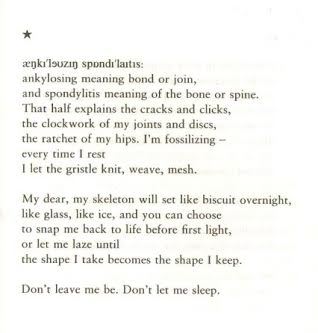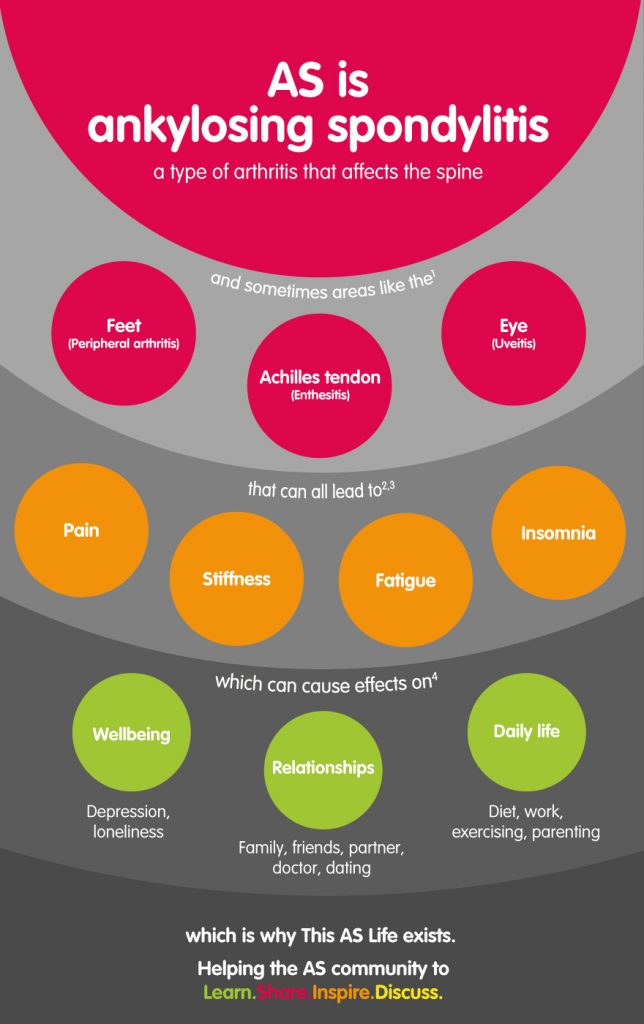Tomorrow, 7 May, is World Ankylosing Spondylitis Day. I guess it’s an awareness-raising thing, which I dunno. For me, I don’t need the whole world to know about AS. What matters to me is that the people in my life know about it. But anyway, I thought I’d share some info.
Let’s start with arthritis in general, because that’s definitely a thing that a lot of people have misconceptions about – or just don’t know much at all. And that’s fine, neither did I until I got it.
I was 27 when I was diagnosed and my first thought was obvious: I’m too young to have arthritis!
Nope. There’s over 140 types of arthritis, and they affect 530,000 New Zealanders. One in six people over the age of 15.
I have two types – Ankylosing Spondylitis and Fibromyalgia.
AS is such a weird disease. Most people with AS have the gene HLA-B27, but having that gene doesn’t mean you’ll get AS. I got it because I had a “severe inflammatory incident” in my body which triggered the gene.
Here’s some info in a horrible font.
AS affects the axial skeleton (the bones of the spine, lower back and rib cage). It’s typical to get inflammation in your sacroiliac joints, where the pelvis and spine meet. This is the spondylitis bit. The anklylosing bit is about bone formation, because as the disease progresses, the affected bones can fuse together.
Of course I hope that doesn’t happen to me, although I’ve been told that if it does, a lot of the pain goes away. So that could be a good thing. I’ve also been told that the pain lessens as you get older.
Everyone experiences AS differently. Unfortunately, I haven’t met many women my age who have it, but all of us have very different stories. Some people are able to work fulltime, and some are much more severely effected. Sometimes medication helps and sometimes it doesn’t.
For me, the pain is constant. It starts in my glutes, spreads through my pelvis and hips, heads up my spine, flares out into my ribs, works its way deep into my shoulder blades, and ends in my shoulders and neck. All of these places hurt all of the time, although there’s things I can do to mitigate it.
Exercise is really important with AS, because of the joint stiffness that can lead to bone fusion. So I try to keep moving even when I’m really exhausted. Chronic fatigue is another symptom.
I’m on an immunosuppresent called Humira. Because part of what causes AS is your immune system overreacting, many of the medications developed for it focus on calming this down. I also take a few different things to manage pain and other symptoms like insomnia and inflammatory bowel.
The writer Simon Armitage has AS, and he wrote this amazing poem about it.
 I’ve also written some poems about it, several of which are in my zine, Skeletal Mosaic. (Shameless plug, as I’m about to put it up for sale and I’m terrified no one will buy it).
I’ve also written some poems about it, several of which are in my zine, Skeletal Mosaic. (Shameless plug, as I’m about to put it up for sale and I’m terrified no one will buy it).
I guess the main thing to remember is that AS is like any other illness or disability: it’s all about the individual. The way in which I experience it, the ways in which I need help or support, the ways in which I feel sad or frustrated – they’re all different to everyone else.
And for me, the most important thing isn’t a narrative of triumph over adversity. I’m not going to try and pretend I’m not disabled. Acceptance – which is fucking difficult – has been one of the keys for me in moving forward and living a new life.
That’s what I want to say on World AS Day. Don’t pretend we’re not ill. We are. Love us along with everything that means.


I have this too and I’ve been pretend i don’t And now I’m on a works of pain and really just afraid of what the future holds for me as a mom of 4 (youngest 2) and a wife who holds down the fort. I do everything and now i feel like i will be able to do nothing and I’m so very sad and so very afraid of this life ahead of me.
Erika, it’s really important that you don’t pretend not to have AS, because 1) if you do, it will get worse faster than if you face it head on; 2) doing the correct exercises is extremely important. (Look them up at http://www.nass.co.uk); 3) People around you need to know. How can they support you when you need support if they don’t? This includes employers and work colleagues.